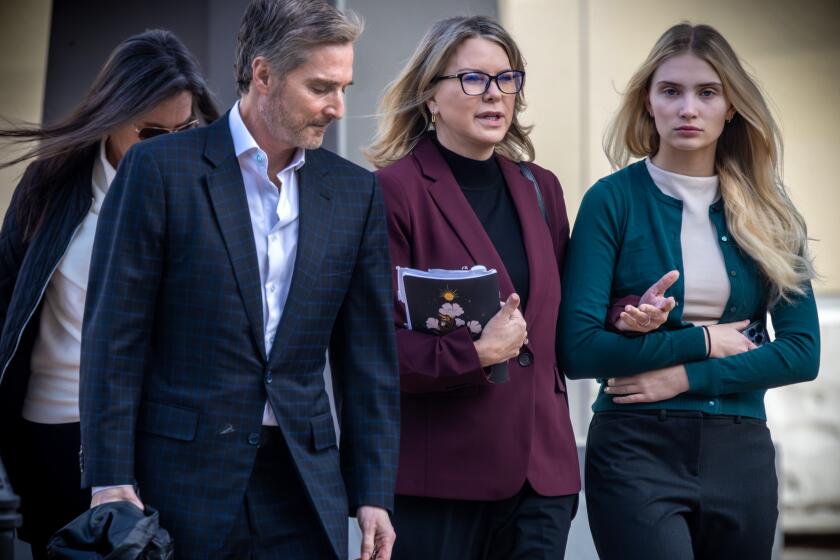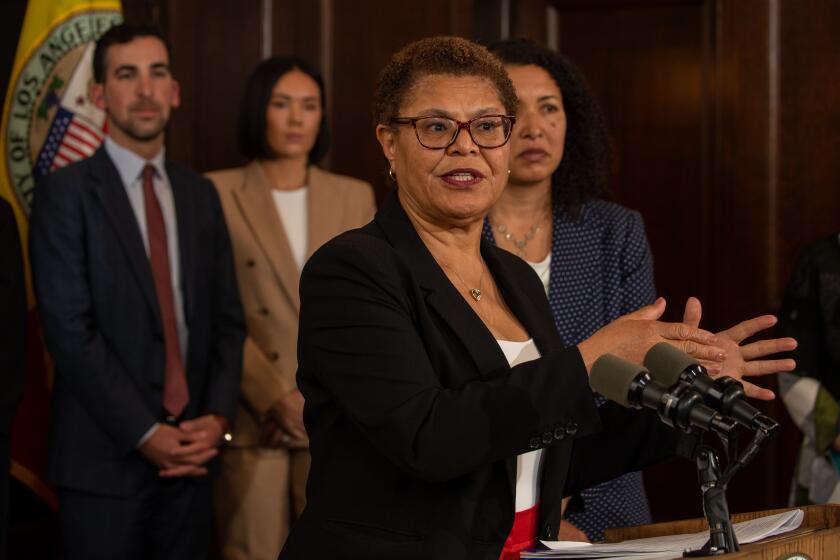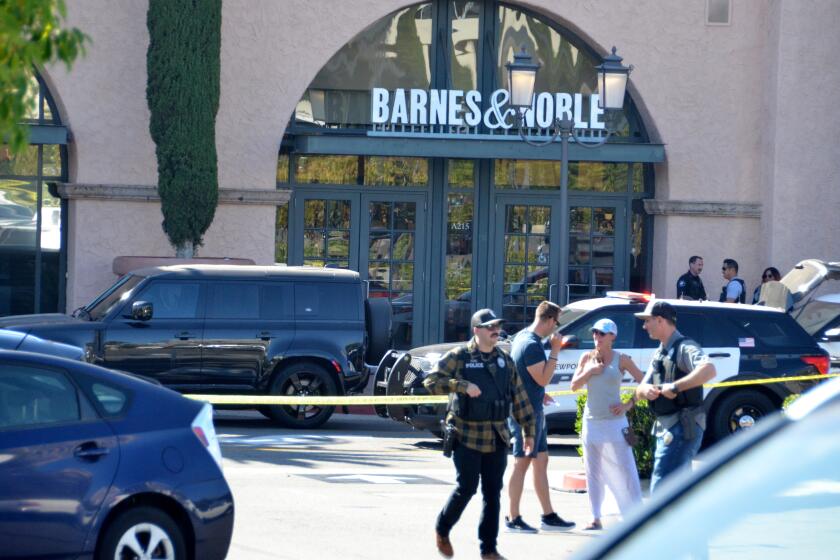Judge texted prosecutor during murder trial, then downplayed it. She almost lost her job

A Los Angeles County Superior Court judge who was overseeing a murder trial has been disciplined for sending a text message to a former colleague in the district attorney’s office to question the prosecutor’s trial strategy.
The text messages resulted in Judge Emily J. Cole’s public censure, the strongest sanction that a judicial commission can impose on a judge, short of being removed from the court. Cole served as a deputy district attorney in Los Angeles County for 13 years until she was elected to the bench in 2020 and started her first term the following year.
The Commission on Judicial Performance reviewed Cole’s conduct that stemmed from an April 28, 2023, court hearing during a murder trial, according to a commission report published May 28.
“Judge Cole’s misconduct is serious and undermined the integrity of, and respect for, the judiciary,” Commission Chairperson Michael Moodian said in the report. “Judge Cole’s conduct in sending text messages to her former colleague during a murder trial was antithetical to her role as a judge. She attempted to put a thumb on the scales of justice, crossed the line from an impartial judicial officer to an advocate, and displayed neither neutrality nor wisdom.”
A motion by the prosecution sought to either remove the convicted murderer’s new lead attorney or have her formally waive a conflict of interest. She agreed to the latter.
Cole presided over the murder trial of Travis Rockhill. It was the second trial on the same charges because during the first trial Rockhill made an allegedly incriminating comment in front of the court’s bailiff, Los Angeles County Sheriff’s Deputy Randy Smalls, according to the commission report.
During the second trial, Smalls was assigned to a separate courtroom but was made available as a witness for either the prosecution or Rockhill’s defense.
During the April 28 hearing, Rockhill testified in his own defense. After the jury was excused for the day, Cole spoke to the attorneys, who both said off the record that they did not plan to call any additional witnesses.
Deputy district attorney Yujin Yi was prosecuting the case and Peter Garner from the Alternate Public Defender’s office represented Rockhill. While the parties said they did not plan to call any additional witnesses, the evidence portion of the trial was ongoing. Yi had not rested the prosecution’s rebuttal phase, according to the commission report.
The proceedings before Cole on that day concluded at 3:53 p.m., and less than a minute later the judge messaged her former colleague, deputy district attorney Kevin Sexton, who had observed Rockhill’s testimony earlier in the day from inside the courtroom, according to the commission.
Cole wrote, “She’s not calling Smalls after that??? Why??”
Sexton responded, “Not a clue.”
Cole wrote back, “Maybe people should talk it over with her??”
U.S. District Judge Otis D. Wright II says that the practice of arresting immigrants at their homes without a judicial warrant is unconstitutional.
The commission concluded that Cole implied that Yi should have called Smalls to testify and someone in the D.A.’s office should get that message across to Yi. Ultimately, Yi did not call Smalls to testify during the rebuttal phase, the commission report said.
After both parties rested their cases, the jury deliberated for about six days and returned a guilty verdict against Rockhill, according to the commission report. He was sentenced to 25 years to life in prison, according to court records.
After the verdict was delivered, Sexton notified Yi of Cole’s text messages. The following day, the DA’s office notified Rockhill’s defense attorney at the Alternate Public Defender’s office and Supervising Judge Denise McLaughlin-Bennett.
McLaughlin-Bennett contacted Cole on May 12, 2023, about the text messages and asked her to “disclose the communication on the record, and recuse herself [from the case], on her first day back at court on May 15, 2023,” according to the commission report.
Cole disclosed on the record the text messages to the attorneys on both sides during a court hearing. She indicated the messages were sent “after each side rested, after hours,” according to the court records. She said that the messages were “inexcusable.”
McLaughlin-Bennett criticized Cole’s framing of the situation and instructed her to “objectively state what happened in chronological order without trying to minimize, explain or distort facts.”
A representative of Fix the City, the nonprofit group that filed the lawsuit, said the organization will file an appeal of the judge’s ruling.
The commission said the attorneys in the case had not rested their arguments when Cole sent the text message and messaged Sexton during work hours. Cole modified her statement in the court record on May 26, 2023, to clarify that “both sides had rested their case-in-chief” but that too was misleading, according to the commission’s findings, because it appeared that Cole was trying to minimize her actions and the timing was inaccurate.
Her “false and misleading statements” in the court’s minute orders and a letter to the commission violated multiple canons in the California Code of Judicial Ethics, the commission found.
The commission also noted that this was Cole’s first disciplinary matter and she acted to disclose the messages to all the parties involved and accepted responsibility in person to a supervising judge and in writing to the commission. Cole also admitted that her initial attempts to disclose the text messages were inaccurate, and she agreed in the commission’s stipulation on the matter. Nine members of the commission approved the stipulation for discipline on May 15 of this year.
Cole’s attorney, Paul Meyer, said in a statement that she “deeply regrets, and has learned from, her inappropriate communication.?She earned a reputation as an impartial jurist and is embarrassed by this isolated momentary lapse. She took immediate responsibility and emphasizes that this will not happen again.”
Cole’s term as judge ends in January 2027.
More to Read
Start your day right
Sign up for Essential California for news, features and recommendations from the L.A. Times and beyond in your inbox six days a week.
You may occasionally receive promotional content from the Los Angeles Times.










